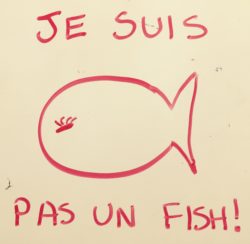“Quite strange results”, like those found in Hamada, Nagashima, & Shiomi’s (2001) research on “collagen as a new fish allergen”, often manifest from adaptations of “children’s literature” like Alice in Wonderland. Strange adaptations of Alice, according to Martin (2010), are evident when we examine “the particular ways in which these stories have been translated into the interactive medium of video games” (p. 134). While Gee (2005) never really conducted research on the effect of collagen on fish in Far Cry he does state somewhere in the book that “if players stare at the pretty fish in the island paradise of Far Cry, they’ll die in a minute”. This is not to say that Far Cry is an accurate adaptation of Alice (or anything close), but like Alice herself, we “arrive at a piece of knowledge, that all the poems are about fish” (Empson, 1935).
Far be it for me to say that all scholarly research articles, like poems, are about fish or Alice in Wonderland. And indeed, those blessed or cursed by a recent reading of Alice might summon “Mock Turtle’s remark that no wise fish would go anywhere without a porpoise” (Holmes, 1959).
However, if we are to endure scholarly writing and understand its purpose then a re-reading of Lincoln’s (2009) What a Long, Strange Trip It’s Been…: Twenty-Five Years of Qualitative and New Paradigm Research, might be of value. Of course when I say ‘value’ I refer to how relevant the research might be for a particular field, community of practice or the researchers themselves. Strange as it may seem there is better precedence for my naïve statement found in Smeyer’s (2006) article The Relevance of Irrelevant Research; The Irrelevance of Relevant Research.
To properly summarize the potential irrelevancy of my indulgent digressions, I point to The General Irrelevance of the General Impossibility Theorem, where Tullock (1967), near the conclusion of his article states that “the majority voting process normally leads to a determinate outcome and that this outcome is apt to be reasonably satisfactory will surprise no practical man” (p. 270). In light of recent elections in that strangest of countries that too many post-colonialists like to interpret, being surprised, however impossible or irrelevant, seems to be a common sentiment. Should you worry about fish research though? Should you give Alice a re-read or play one of many adaptations in the form of a video-game? Given that the president of said strange country is navigating the populace down the proverbial rabbit hole issuing “gag orders and funding freezes at the Environmental Protection Agency, the U.S. Department of Agriculture and other federal agencies” (science news, February 6th 2017), I can assert with an increasing amount of relevance that the state of the world we call America is undergoing one hell of a “descent into eeriness” (Mori, MacDorman & Kageki, 2012).
Therefore, consciously propagating strange results from seemingly unconnected authors makes just as much sense right now as the “shift from empathy to revulsion” akin to our “approach of any robot that fails to attain, a lifelike appearance”. We all must endure the “uncanny valley”; once the realm of robotics, writing and video games, now the domain of politics.
Unsuspecting References
Empson, W. (1935). Alice in wonderland: The child as swain. Some Versions of Pastoral, 253-94.
Hamada, Y., Nagashima, Y., & Shiomi, K. (2001). Identification of collagen as a new fish allergen. Bioscience, biotechnology, and biochemistry, 65(2), 285-291.
Holmes, R. W. (1959). The Philosopher’s” Alice in Wonderland”. The Antioch Review, 19(2), 133-149.
Lincoln, Y. S. (2009). “What a long, strange trip it’s been…”: Twenty-five years of qualitative and new paradigm research. Qualitative Inquiry.
Martin, C. (2010). ‘Wonderland’s become quite strange’: From Lewis Carroll’s Alice to American McGee’s Alice. Beyond adaptation: Essays on radical transformations of original works, 133-143.
Mori, M., MacDorman, K. F., & Kageki, N. (2012). The uncanny valley [from the field]. IEEE Robotics & Automation Magazine, 19(2), 98-100.
Gee, J. P. (2005). Learning by design: Good video games as learning machines. E-Learning and Digital Media, 2(1), 5-16.
Smeyers, P. (2006). The relevance of irrelevant research; the irrelevance of relevant research. In Educational Research: Why ‘What Works’ Doesn’t Work (pp. 95-108). Springer Netherlands.
Tullock, G. (1967). The general irrelevance of the general impossibility theorem. The Quarterly Journal of Economics, 81(2), 256-270.
Trump administration clampdowns on research agencies worry scientists


Leave a Reply